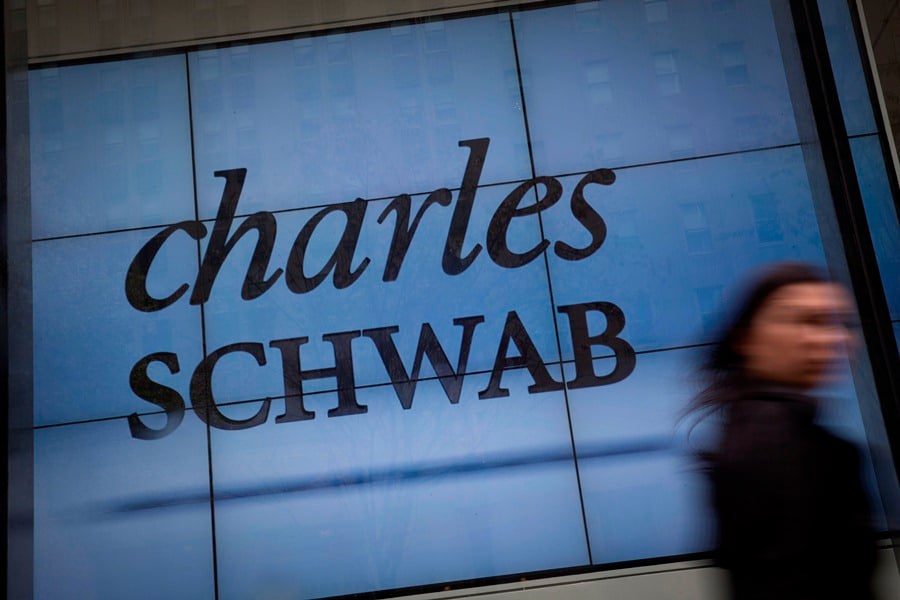Borrowing a page from the product development playbook of its
retail online advice platform, Charles Schwab & Co. will require advisers who use the institutional version of its robo-platform to hold a certain amount of client assets in cash.
The company, which expects to launch its adviser robo-service named Institutional Intelligent Portfolios sometime in the second quarter, will insist that all advisers using the service maintain a 4% allocation to cash. Advisers with less than $100 million in client assets held in custody by Schwab will also be charged an annual fee of 10 basis points, while those with assets above that threshold will not be charged the fee.
About 70% of the 7,100 advisory firms on Schwab's custodial platform have fewer than $100 million in assets on the platform.
“We've long felt that cash is one of the best stabilizers . . . hence you're seeing cash built into the portfolios,” Bernie Clark, Schwab Advisor Services' executive vice president, said.
The cash requirement also allows Schwab to offer the service for “free” — without account service fees, trading commissions or custody fees charged to advisers' clients — since the cash will be swept into Schwab Bank, where Schwab will be able to generate revenue on interest rate spreads.
“It does support the platform, obviously, because it's swept into the FDIC bank cash product,” Mr. Clark added. “But advisers will determine from there if they want to have higher cash allocation.”
The average cash balance is 7-9% percent in custody for registered investment advisers at Schwab, according to Naureen Hassan, executive vice president of Schwab Intelligent Portfolios. The required cash allocation supports the Institutional Intelligent Portfolios platform and its program capabilities like rebalancing and tax loss harvesting
Advisers using Institutional Intelligent Portfolios will have access to more than 200 exchange traded-funds and 28 asset classes.
Advisers will also be able to customize the robo-adviser with their own branding.
Schwab's announcement of a robo-platform for retail investors
was met with criticism from some advisers and competitors in the robo arena, who felt that the company was being deceitful by promoting its service as “free.” In the retail version, investors are required to maintain a 6% allocation to cash.
Adam Nash, chief executive of Wealthfront, a rival to Schwab's robo-offering,
wrote a blog post that bashed the San Francisco-based discount broker-dealer for forgetting its values and hiding fees under the term “free.”
Ben Carlson, an investment analyst at Van Andel Institute with the blog “A Wealth of Common Sense,” is not surprised by Schwab's robo-offering for advisers.
“A lot of advisers use Schwab for other purposes, so it definitely makes sense for them to pay attention to the adviser,” he said. “I think where we're eventually headed is almost every fund shop or ETF provider will have some form of a robo-adviser.”
Still, with its brand and assets, Schwab is expected to be successful in its robo-platform.
“For all the adviser bashing that Betterment used to do and Wealthfront still does, it takes time for the product providers to realize the magnitude of the assets the advisory community controls, and maybe it's going to be more effective for them to partner instead of fight,” James Osborne, a certified financial planner and president of Bason Asset in Lakewood, Colo., said.
Betterment recently entered
the business to business model of a robo-platform for advisers. Jon Stein, Betterment's chief executive, agreed that Schwab will be very successful because it is the biggest registered investment advisory custodian.
“If they couldn't make something work, I'd be shocked,” Mr. Stein said.
He said the key differences between his company and Schwab, however, is that Betterment only has one fee and is transparent.
“We aren't making money on the back end, that's where Schwab is making money, and that means not working on the customer's best interest,” Mr. Stein said. “It's not well aligned, so the product won't make the best decisions for customers and advisers.”







